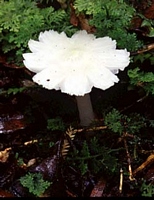|
 Humidicutis pura Humidicutis pura
SynonymsHygrophorus purus
Images (click to enlarge)
Caption: Humidicutis pura
Owner: Kaimai Bush | 
Caption: Fig 44. Humidicutis pura (Peck) Horak (D-F: ZT 2011): D. basidiomes.
E. spores. F. basidia. (K 654, type): G. spores. | 
Caption: FUNNZ: 2006/0014, See public note for more information
Owner: FUNNZ |
Article: Horak, E. (1990). Monograph of the New Zealand Hygrophoraceae (Agaricales). New Zealand Journal of Botany 28(3): 255-306 (http://www.rsnz.org/publish/abstracts.php).
Description: Pileus -60 mm, conical becoming convex to umbonate-plane, margin radially splitting
in aged : specimens; ivory to whitish; dry, silky to radially fibrillose, slightly
striate at margin. - Lamellae distant to crowded, free to adnexed, up to 6 mm
wide; white, edges entire, concolorous. - Stipe 20-60 x 3-8 mm, cylindrical,
equal or attenuated towards base, sometimes subfusoid; white; dry, silky, hollow,
very brittle, often twisted, single. - Context white, fragile. -Odour and taste
not distinctive. -Chemical reactions on pileus: KOH, HCI, and NH3
- negative.
Spores 6-9 (-10) x 4-5 um, ellipsoid. - Basidia 30-42 x 6-8 um, 4-spored, with
medallion-like clamp connection at basal septum. - Cystidia absent - Pileipellis
a cutis of repent, cylindrical hyphae (25 um diam.), hyaline membrane not gelatinised,
minutely encrusted with pigment; clamp connections absent on septa of cuticular
hyphae (Pl. 1, Fig. 8).
Habitat: ECOLOGY: Common; saprobic on soil among litter in beech forest (Nothofagus
menziesii-N. fusca) or among Sphagnum in broadleaved-conifer forests
(Leptospermum scoparium, Quintinia, Dacrydium). March-June.
Distribution: DISTRIBUTION: NZ (G, W, N, WL), USA.
Notes: All characters observed on the North American Hygrophorus purus Peck essentially
agree with those described for H. mavis Stev. which in New Zealand is
widely distributed both in Nothofagus and broadleaved-conifer forests.
The revision of authentic North American material kept in the Hesler collections
(MICH) demonstrated that both the macroscopic and the microscopic data for Hygrophorus
purus Peck are obviously erroneous (Hesler & Smith 1963: 214). The surface
of pileus and stipe lacks gelatinised hyphae and therefore this fungus is misplaced
in subsect. Psittacini. Clamp connections are absent or very rare on septa of
the pileipellis but occur regularly at the base of the basidia. Hence the macroscopic
and microscopic features clearly fit the generic circumscription of Humidicutis
(Singer) Singer (Horak 1968: 281), and accordingly its transfer to this taxon
is proposed.
|